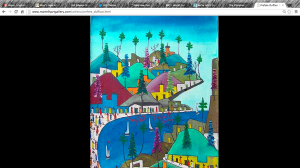British agencies take new interest in #Haiti, but not enough

Prototype for Jalousie? Surely not. One of Prefete Duffaut’s paintings of his imaginary cities in the sky
Two Haiti events in two days – both brought to us by British agencies. It is fitting – and probably to be expected – barely a week after the UK opened its first embassy here in 47 years (Not sure of the correlation but it sounds like too much of a coincidence).
On Tuesday, from my old employer, the BBC World Service, a special programme broadcast from Jalousie, the enormous, shameful, shanty town in the mountains high above Port au Prince. Jalousie is newly tarted up in supposed homage to Haitian painter Prefete Duffaut’s imagined cities in the sky.
And in London, on Monday, my old haunt, the Frontline Club, asked the question why – after three years and $15.3 billion – is Haiti still a country in crisis?
The London discussion brought together film-maker Inigo Gilmore, Haitian-born teacher Mario Gousse, Arjan Hehenkamp of Medecins Sans Frontieres and Jonathan Katz, former AP correspondent in Haiti and author of The Big Truck That Went By: How the World Came to Save Haiti and Left Behind a Disaster.
Not sure how the London session went but the WS programme from Jalousie was a typical example of cheap radio recently embraced by the BBC as its answer to cost-cutting.
‘World Have Your Say’, the programme the World Service grandly calls the “global conversation”, was a good idea when it began. Not so much now, when it has expanded to take over many more hours of the newsday, often featuring the uninformed, if passionate, discussing pointless issues in excruciating detail. (A good example was the serious deliberation given to four-year-old Abigael’s tearful complaint against an overdose of ‘Broncobama’ and Mitt Romney back in early November just days before America voted. For those who remember, Abigael’s mother had cannily recorded her child’s distress and put it on Youtube.)
The Jalousie Port au Prince, programme was not quite as bad. But it didn’t do enough to examine the different strands that make up Haiti’s reality and the complex reasons it is unable (and/or unwilling) to move on. There was so much an informed “global conversation” could have done. It could’ve compared and contrasted criticism of the current Haitian government’s tendency to favour style over substance with the way governance works (or doesn’t) in other parts of the world. It might have looked at Haiti’s problems in a more hard-eyed way, adding comparison and insight from other, similar countries. It might have discussed how and why Mongolia is able to offer new, low-interest mortgages to homeowners/ potential homeowners in Ulan Bator’s appalling ‘ger’ districts, where there is no running water or heating. (A little like Jalousie? But the Mongolian government expects the ‘ger’ districts to be firmly in the past in a decade or so. Why can’t Haiti have a similar scheme?)
The BBC World Service could’ve put Haiti’s present in the context of its past. It could’ve placed Haiti in a world context. Instead, it conducted a formless exercise in that modern pastime: venting.


